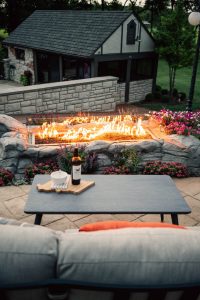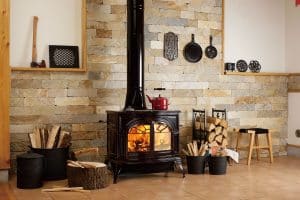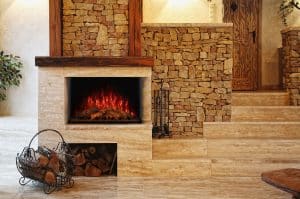Gas Bans and Bans On Bans
You’ve likely seen news about “gas bans”, “ban on bans”, or “fuel choice” passing in and out of state legislatures. Here’s a quick breakdown of what these mean for the fireplace and BBQ industries.
What Are Gas Bans and Bans On Bans?

Currently, half of all US states have some kind of legislation in place to prevent cities and other jurisdictions from telling consumers what energy sources they can and cannot use in their homes and businesses. For example, California is one of the few states who have banned natural gas appliances. In this case, they focused on banning natural gas heating systems in new construction builds; the end goal to have all new homes utilizing zero-emission heat pumps by 2030. It should be noted that this ban does not include ovens and cooktops, water heaters, clothes driers, or gas fireplaces and stoves. This ban also does not prevent cities like Los Angeles from further banning these additional appliances from new builds. The negative impact on our industry is felt by fewer homes having a gas connection, meaning fewer homes that could utilize our gas products.
This kind of scenario has prompted some states to pass legislation to prevent these gas bans (Fuel Choice). Missouri passed its own law in 2021 that ensures cities and counties cannot dictate what fuel sources / hook ups are able to be installed in new construction and major renovations. It should be noted here that no cities in Missouri have enacted any such bans but many have environmental goals they are attempting to meet such as Kansas City.
In 2022, Kansas City looked at their goal of climate neutrality that they had set for 2040. When discussing the choices they had for cleaner energy sources, the options they had were limited by the 2021 ban on bans ruling. This forced them to look to other areas of their Climate Protection Plan such as: renewable electricity and grid improvements, increasing efficiency of commercial and public building plans, and updating infrastructure to make public and human powered transportation options more accessible.

Why Is This Important To The Hearth and Patio Industry?
When legislation is presented, it’s important that representatives from the hearth and patio industries are involved to ensure the wording does not impede our sale and service capabilities. For example, wood stoves have been regulated by the EPA since 1988 to ensure they’re reasonably efficient. Recently in 2020, the second stage of efficiency standards were implemented that took wood stoves from 4.5 grams of smoke per hour to 2.0 grams. There was some turbulence in the fireplace world as all stoves sold had to be certified under this EPA standard. Stoves that did not pass certification were prohibited from being sold and could result in a fine for any store displaying such stoves.
While this did result in the discontinuation of many wood stove models and brands, it also made sure home owners were purchasing the most efficient stoves available which most customers were already looking for. The same is possible for regulations on gas appliances, some of which we’ve already seen in kitchen cook stoves that regulate their efficiency and CO2 production. These aspects only help the end consumer by using less fuel for the same heat outcome, lowering the consumers’ utility bills, as well as preventing the pollution of their indoor air quality.
It’s often hard to decide which side of these legal battles to be on since it’s usually a government entity trying to limit the use of a resource. However, all battles are a middle ground between the government, manufacturers, energy and environmental advocates, consumer groups, and utility conglomerates who are all fighting for the best outcome on their side. It’s important to note here that some of these entities are profit based and have the money to invest in lobbyists that can skew the outcome in the court room, or legislative body.. On the other side, many environmental organizations are in direct opposition to these huge companies and often painted as the villain for this aspect alone, regardless of the activists actual requests and propositions.
While Maschino’s strives to offer the best and newest products on the market, we also try to advocate for your experiences and quality of life behind the scenes. We are constantly in talks with our manufacturers and distributers on things we wish to see added or removed from products, especially if we note that it’s a potential safety issue. We also have members of our team involved in the local legislative efforts that make sure laws being passed are fair and accurate. Because legal battles can take up quite a bit of time and resources, it is important for small businesses such as Maschino’s be a part of national organizations such as the HPBA. They support local fireplace and patio businesses by staying on top of potential legislation that can harm our industry, so we can focus on serving our customers.
For example, in 2021, Missouri proposed a Mechanical License Bill that would require a mechanical contractors license for all HVAC, boiler, heating system, etc. work. This would seem like a reasonable license but the way it had been worded would have meant Maschino’s would require a team member to partake in years of advanced education for us to continue selling, servicing, and installing fireplaces, firepits, and BBQ grills. The required mechanical license training would not have covered these types of gas appliances as extensively as our service tech training does.
Thankfully, the Midwest Hearth, Patio, and Barbecue Association (MWHPBA) stepped in to propose new wording to the bill and fight the case for it. The wording was adopted and later used in similar bills across other states.
How Does This Affect Me?

When doing research for anything going into your home, you likely have a list of wants and needs. Many people come into Maschino’s asking about BTUs, efficiency ratings, and even parts availability already which is perfect. Think about these wants and needs when you see headlines for gas and electrification articles that affect your city, county, or state. When you are doing research and voting on local ballots, staying informed is one of the biggest challenges. Sites like Vote 411 and Missouri’s State Election Page are great resources to keep on hand for staying the most up to date. For information on the fireplace and patio world specifically, the HPBA follows issues nationally and tracks them all in one place. Of course, you’re free to call us here at Maschino’s and ask our team any specific questions you may have. If we don’t have the answer we will help get it for you!
Thank you to Corey Krill, Manager of State Energy Policy at the HBPA, for assisting with this article!

